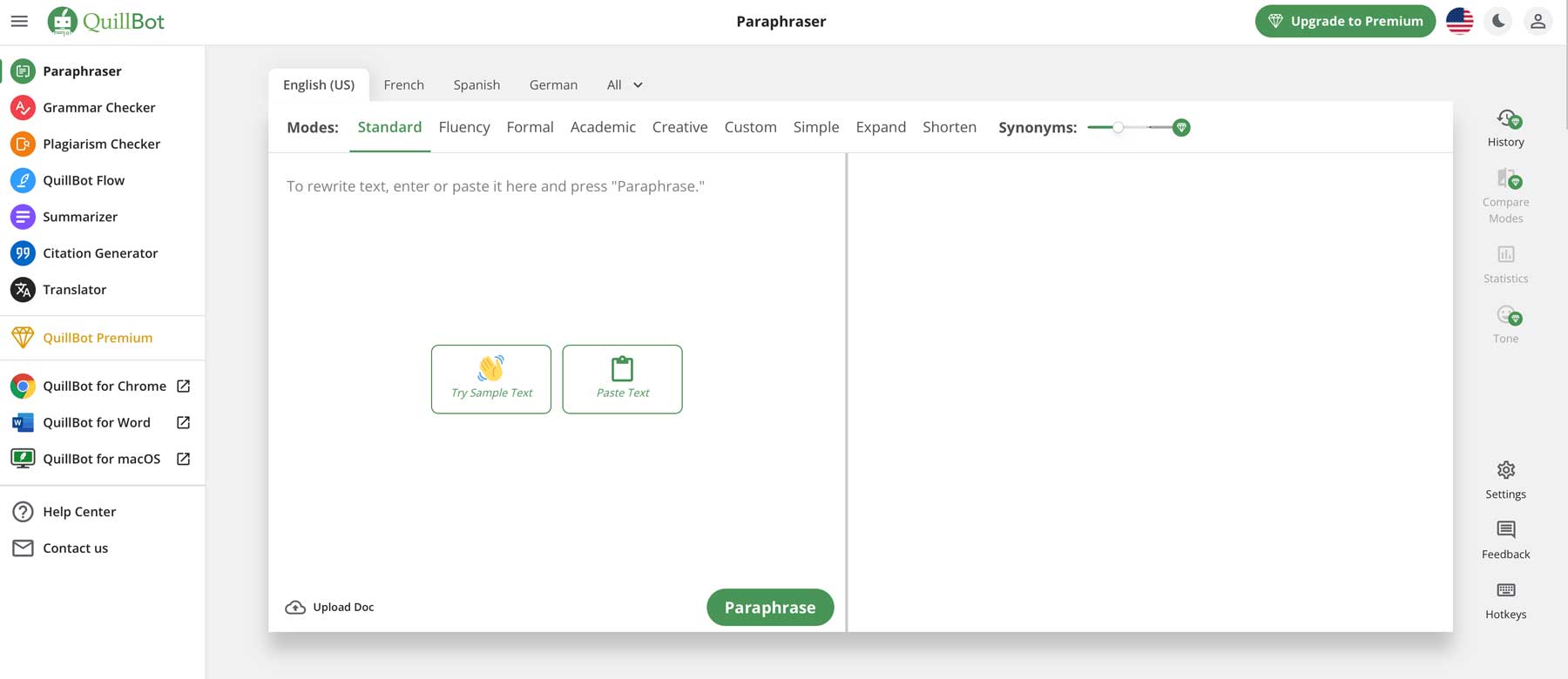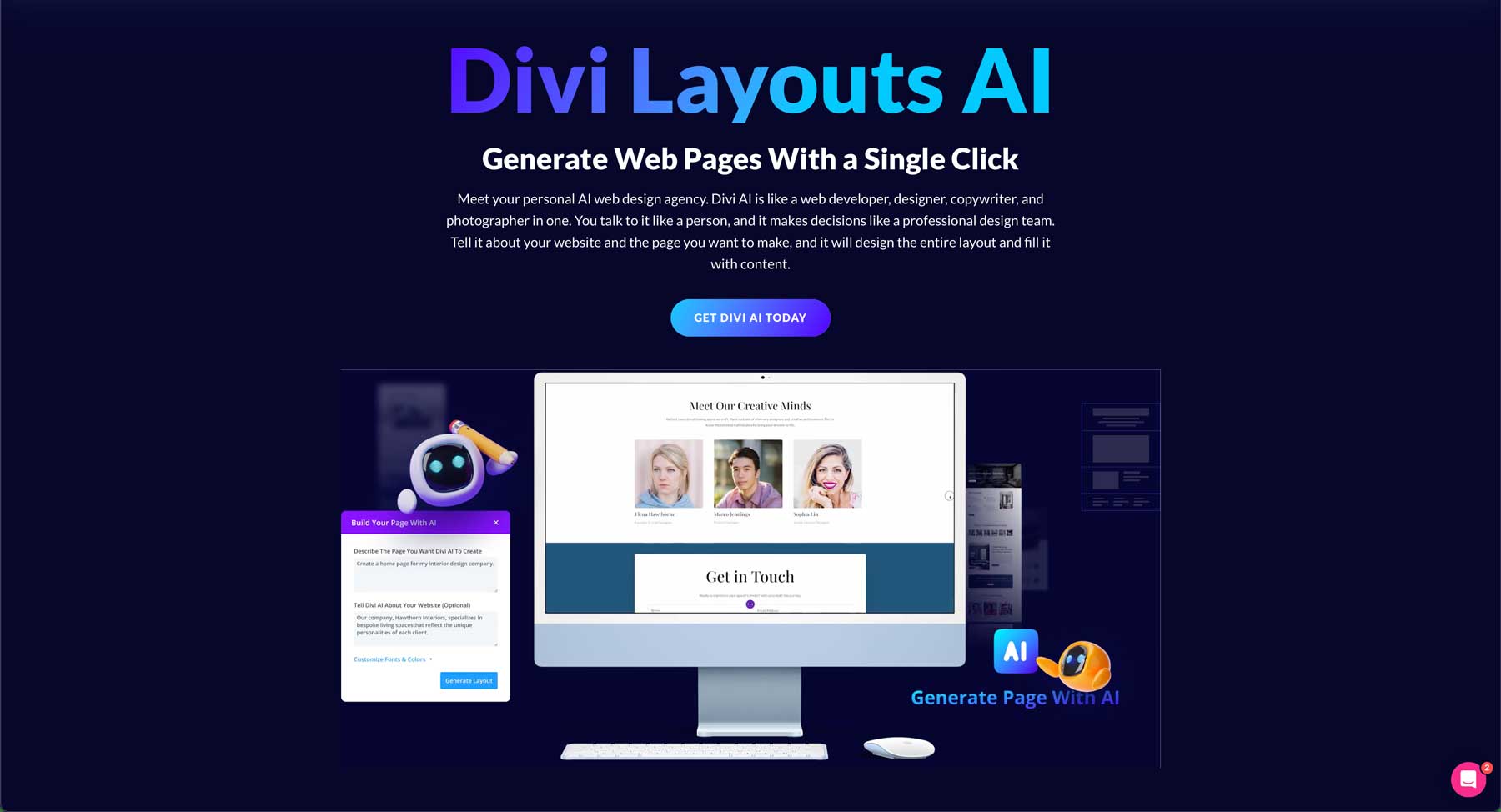Artificial intelligence (AI) has the potential to transform scientific, marketing, and other types of research, making citation and information gathering a whole lot easier. With powerful AI tools at their disposal, researchers from all walks of life are using AI to scan large datasets, enhance communication and fact-gathering amongst teams, and even improve their writing, making it easier to publish their findings. In this post, we’ll introduce you to our picks for the best AI tools for research.
Let’s dive in.
What Is An AI Tool for Research?
AI research tools are built on machine learning and large language models (LLM) that help researchers gather information, conduct literature reviews, analyze citations, and more. They are trained on large amounts of data and allow you to search within publications to extract important information related to your research. Some of these tools can even help rewrite parts of a document, suggest grammar improvements, and summarize larger articles for easy digestion.
What Are the Benefits of Using an AI Tool for Research?
When tasked with rummaging through large amounts of data, implementing an AI tool for research is a good idea. By using these tools, users can drastically improve efficiency and productivity. AI research tools can automate tedious tasks like summarizing, organizing research materials into documents, and streamlining the process. AI-powered tools like Scite can help researchers quickly find relevant publications, analyze citation patterns, and stay current on the latest research.
Additional benefits of using an AI tool for research include faster data analysis, thanks to AI and machine learning algorithms that can analyze large datasets much more quickly than manual methods. These tools can also foster idea generation by providing related keywords, phrases, and summaries of relevant literature.
Regardless of the research you plan to do, the tools on our list offer something for everyone.
The Best AI Tools for Research
Now that we’ve gone through the benefits of using an AI tool for research, let’s take a look at the best AI tools for research on the market today!
1. QuillBot
🥇 Best AI Tool for Summarizing Research
Up first on our list of best AI tools for research is Quillbot. While it’s not a traditional research tool, it has several features that will benefit researchers. First and foremost, Quillbot is an AI paraphrasing tool. It can help people understand complex research by rephrasing text in different ways. This is a great way for researchers to gain perspective on their research by finding simpler ways to word it. Secondly, Quillbot can help you rephrase sentences to avoid unintentional plagiarism if you’re summarizing source material in your research. That said, checking the facts before including content in your research is always a good idea.
Quillbot Offers Browser Extensions and Mobile Apps
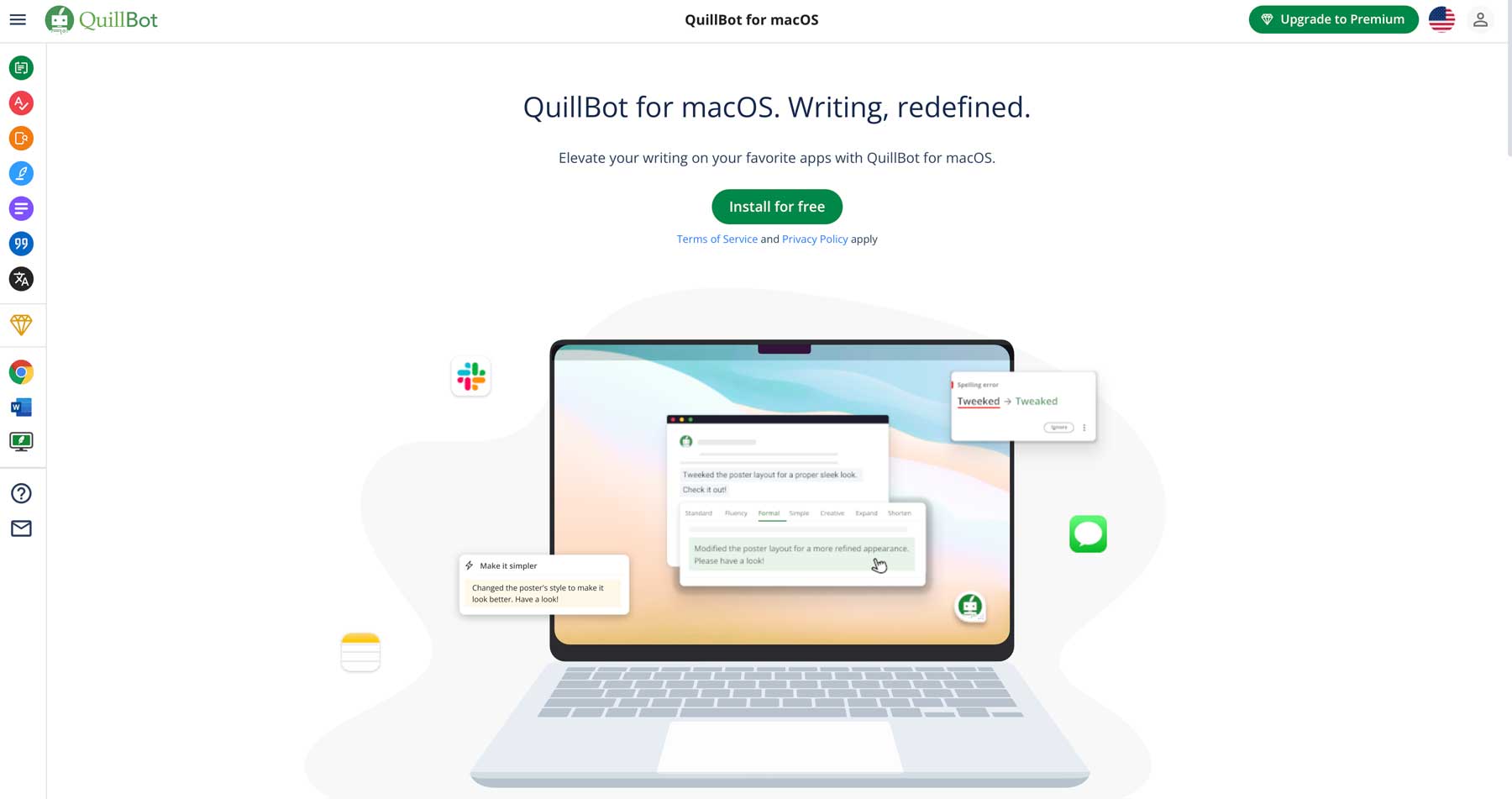
Quillbot expands its features by offering a browser extension for major browsers like Chrome. It integrates seamlessly, so you can paraphrase content while on the go. In addition to browser extensions, Quillbot also provides mobile apps for summarization and grammar checking. That way, you can ensure your research is free of grammatical errors as you write. If you’re a Microsoft Word or Mac OS user, you’re in luck because Quillbot has extensions for those, too.
What We Like About Quillbot
- Multiple Paraphrasing Modes: Quillbot offers different paraphrasing modes, allowing you to tailor paraphrased content to suit your needs
- Grammar and Plagiarism Tools (Paid plans only): Quillbot’s premium plan provides a grammar checker to identify and fix errors along with a plagiarism detector to ensure research is original
- Summarize Lengthy Text: This is the biggest perk for researchers as it can help condense larger amounts of text, making it easier to grasp
- Extensions For Google, MacOS, and Microsoft Word: Paraphrase and summarize on the go, thanks to mobile apps and browser extensions
What Could Be Improved
- No Fact Checking: Since Quillbot is mainly a summarization and paraphrasing tool, it doesn’t have a way to verify the information. Therefore, it’s important to ensure factual accuracy in your research
🥇 Why We Picked It
Quillbot is an excellent supplemental AI tool for researchers, mainly due to its ability to paraphrase complex topics. It can also improve writing clarity and summarize sources, especially when researching lengthy articles.
Who Is Quillbot Best For?
Quillbot is perfect for students and researchers who need assistance summarizing long text, checking for grammatical errors, or rephrasing text for better flow in writing. It can help rephrase content and deepen understanding of complex subjects.
Community Reviews and Ratings
Quillbot users say it’s easy to navigate and love the integration with Microsoft Word. However, some say it occasionally experiences technical issues.
Pricing
Quillbot offers a free plan with paid plans starting at $8.33 per month (billed annually).
2. Bit AI
🥈 Best AI Tool for Research Documents
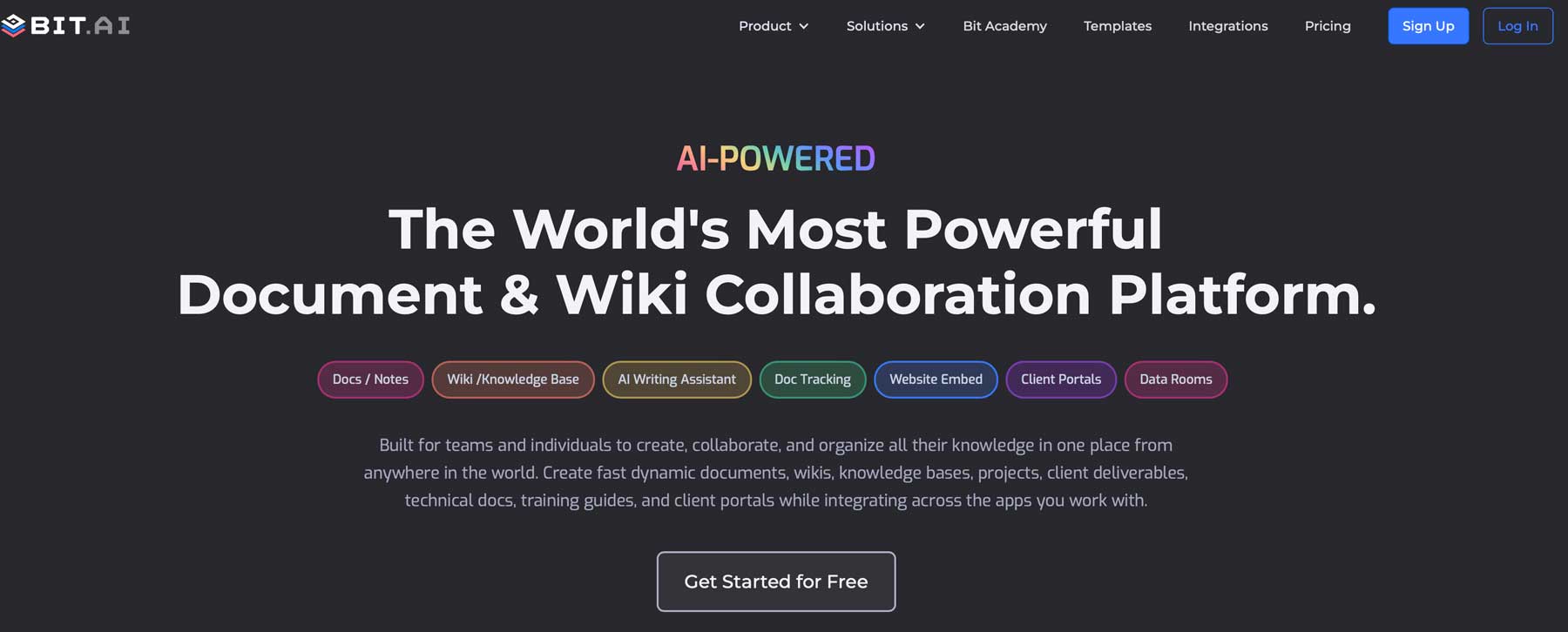
Bit AI is an AI program designed to help teams collaborate on documents, wikis, and knowledge bases. It goes beyond just text and images, allowing users to create interactive documents containing videos, cloud files, and audio. It works much like Google Drive, allowing for real-time collaboration on documents. Multiple people can work on documents simultaneously and chat with one another within the interface.
Create Multimedia Documents and Projects With Ease
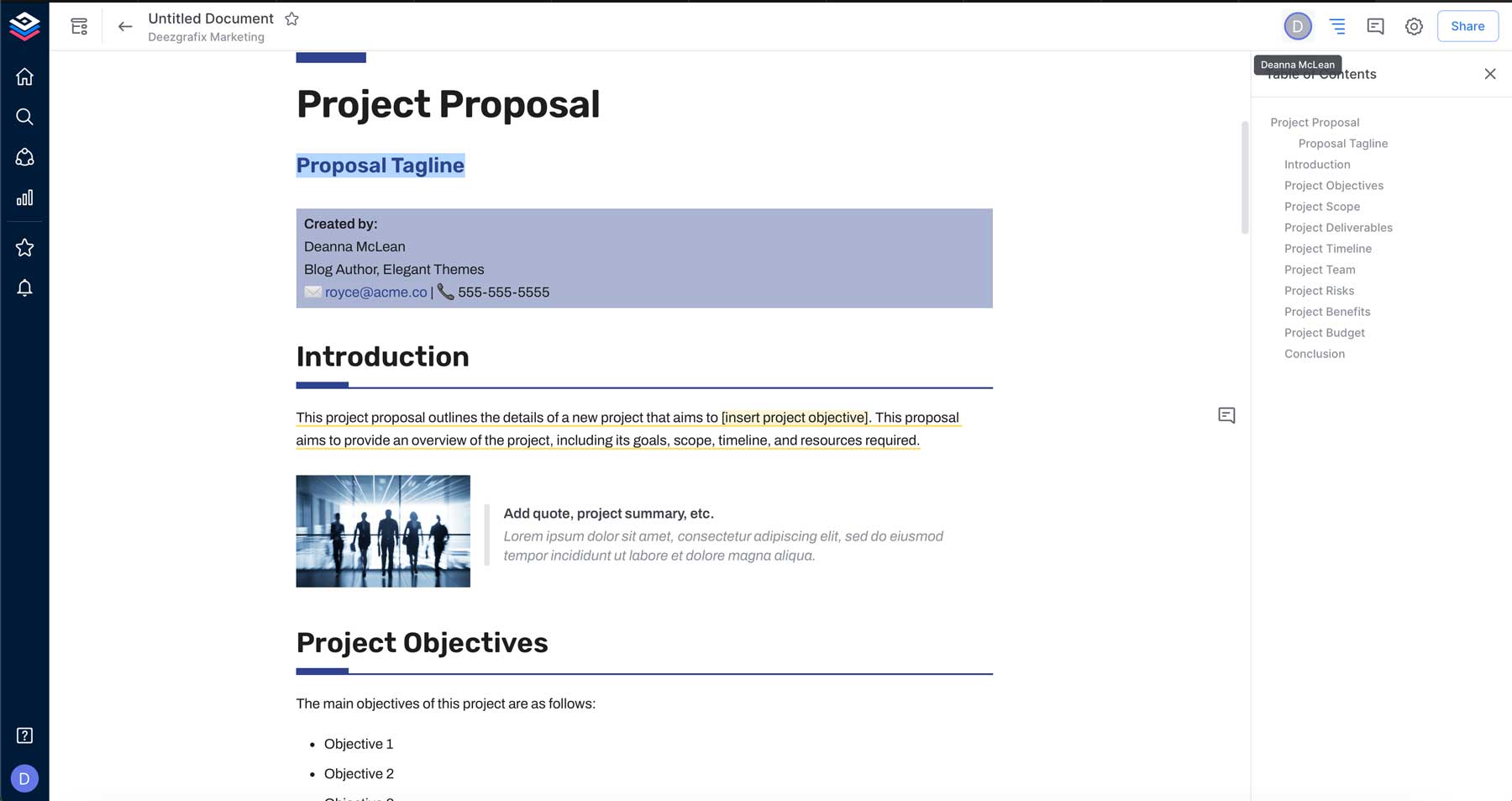
In addition to document creation, Bit AI is an excellent tool for creating wikis, knowledge bases, projects, and more. Thanks to AI Genius, you can easily create custom templates and outlines, assist with research, and answer questions. A Smart Search feature also allows you to save and search all of your media and content assets, such as images, PDFs, links, cloud files, and more. The Smart Wiki tool allows team members to collaborate across documents, adding videos, spreadsheets, databases, and more from various third-party websites or importing their own content.
What We Like About Bit AI
- Built-In AI Writing Assistant: AI Genius is the perfect tool for generating documents, wikis, and other information based on a text prompt
- Multiple Use Cases: Bit AI is great for researchers and marketers, but also for product management, startups, and Human Resources due to its document development features
- Collaboration Tools: Bit.ai allows multiple users to simultaneously collaborate on documents, notes, wikis, and other content in real-time
- Wide Range of Integrations: Bit AI integrates with a large number of third-party tools, including YouTube, Google Sheets, Figma, GitHub, and more
What Could Be Improved
- Limited Customizations: Bit AI would be better if it had text formatting or options to customize the appearance of documents, such as matching company branding
🥈 Why We Picked It
Bit.ai’s comprehensive features, including media integration, cloud storage access, collaborative editing, organized workspaces, and smart document tools, make it a valuable platform for researchers to manage, share, and collaborate on research projects.
Who Is Bit AI Best For?
Bit AI is a multi-faceted AI tool for research that caters to teams. Thanks to its collaborative features, those in the research field, small businesses, or educational users will benefit the most from Bit AI. Using Bit AI, these types of users can easily create, manage, share, and organize their multimedia documents.
Community Reviews and Ratings
Bit AI users say it excels at generating content and creating multi-functional documents. However, the formatting and customization options could be better.
Pricing
Bit AI offers a free plan with paid plans starting at $12 per month.
3. Scite
🥉 Best AI Tool for Research Citations
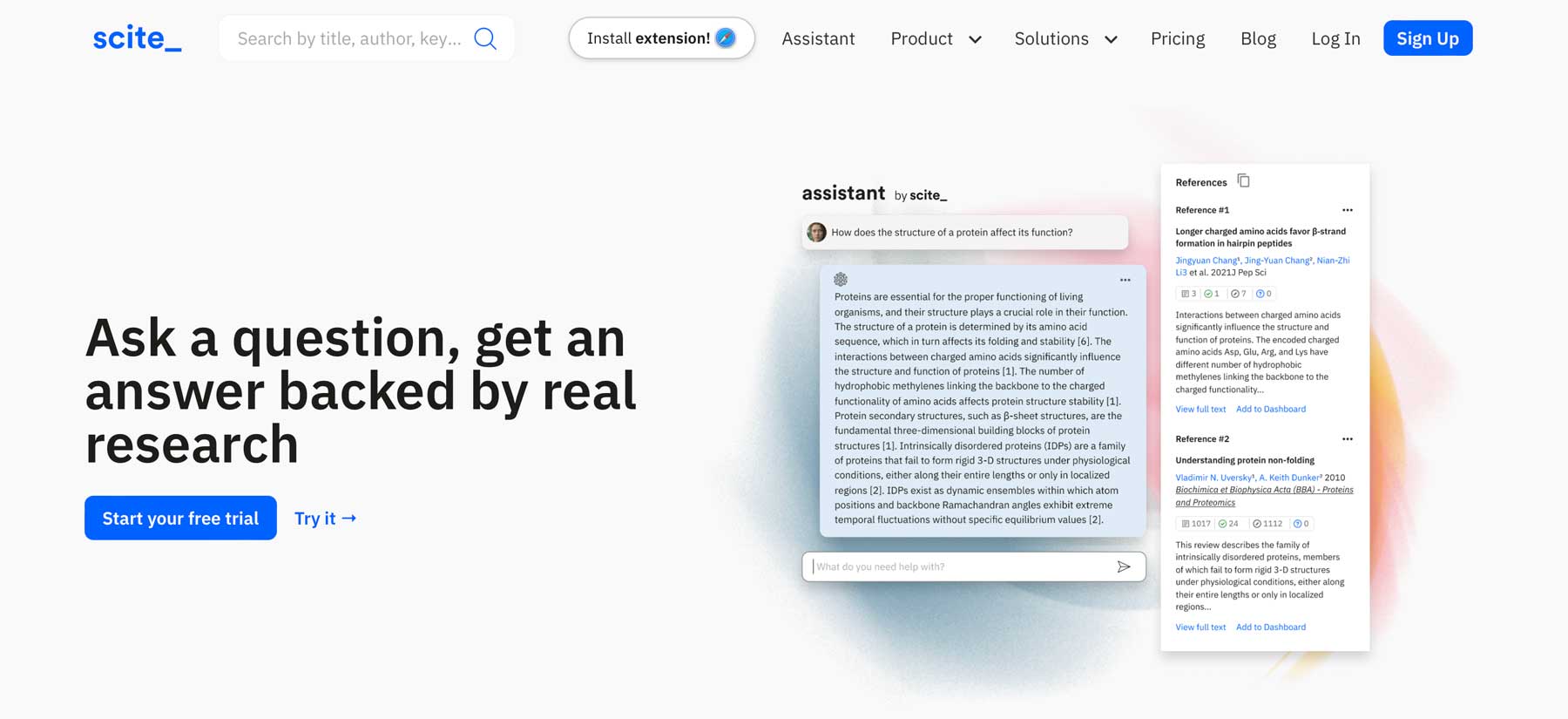
Scite is an AI tool for research that uses artificial intelligence to enhance the way researchers discover and analyze scientific articles. It goes beyond traditional citation counts by providing a tool called Smart Citations. Using AI, Scite analyzes the context in which an article is referenced, revealing whether the citing paper supports, contradicts, or mentions the earlier work. Scite’s vast database, which contains over 1.2 billion citations, allows researchers to better understand the conversation surrounding a particular subject. Scite provides the most relevant content for your research by taking this approach, saving time and effort.
Gain Insight Into Citations With In-Dept Citation Reports
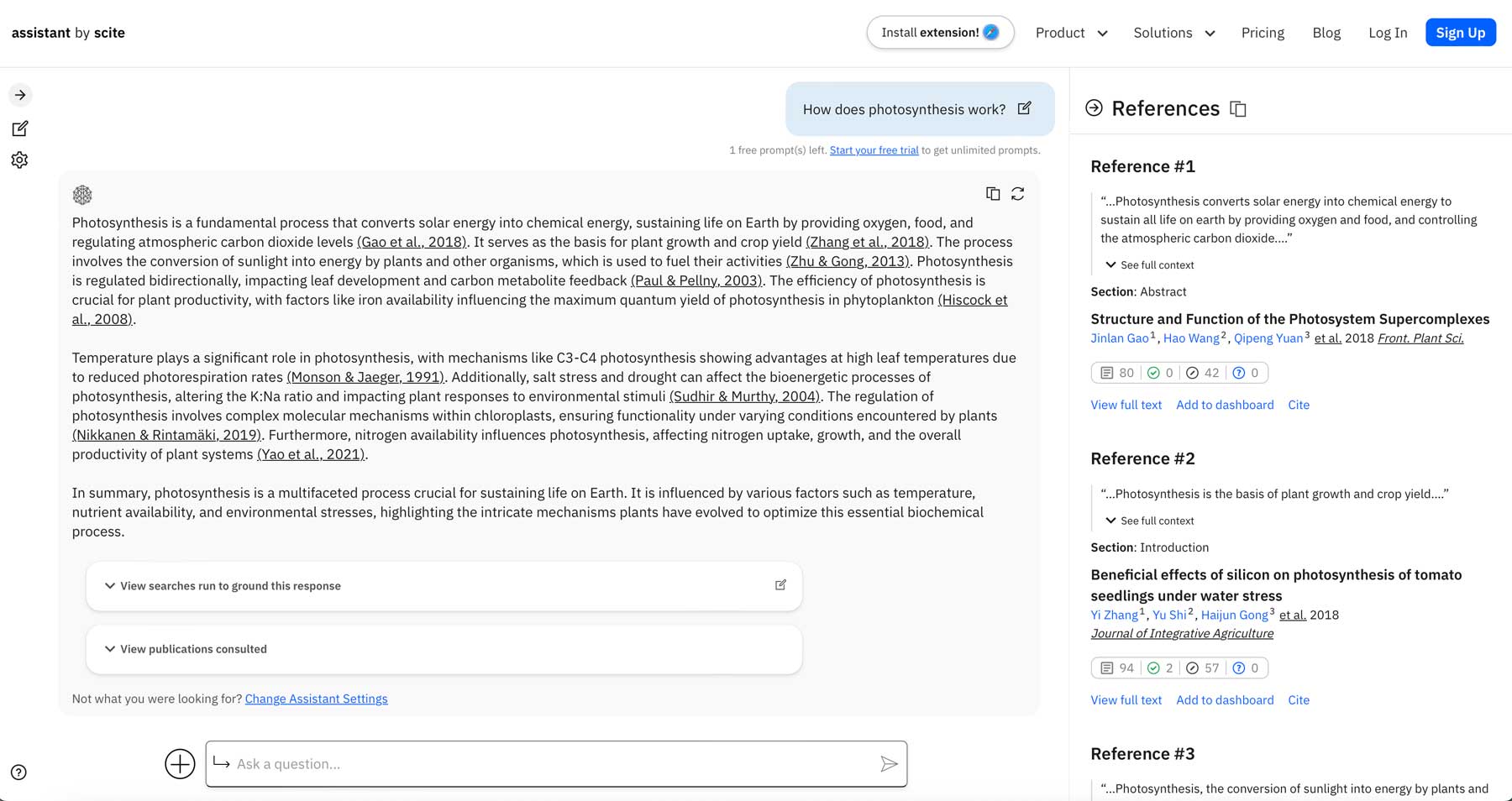
Another useful feature of Scite is its Citation Reports. When researching a subject, Scite will provide an analysis of how the scientific community has received a research publication. These reports provide critical insight into how often a work has been cited and how the citing papers discuss it. Furthermore, each citation in the report is classified as supporting, contrasting, or just a mention, so you’ll have a clearer picture of whether to use it in your research.
What We Like About Scite
- Smart Citations: Scite analyzes how an article is referenced in other research. It can tell you if the citing article supports, contradicts, or simply mentions the original article
- Citation Context: Scite shows you how different sections of an article are being cited in other research, which helps you to understand how the original research is being used and interpreted by other researchers
- Citation Reports: Generates reports that show you citation patterns and trends, which helps users to identify articles and authors in a related field
- Large Dataset: Scite was training on more than 187 million articles, books, preprints, and other datasets, making it a solid choice for researchers
What Could Be Improved
- Not All Articles Cited Are Accessible: Although Scite offers full-text access for most articles cited, some publishers have not
🥉 Why We Picked It
Researching complex topics can be daunting and time-consuming. Thanks to Scite, researchers can concentrate more on analyzing citations for relevancy rather than information retrieval. Scite dives deep into analyzing how research papers connect through citations. This quickly provides insight into the most relevant and impactful studies, saving time and effort and helping researchers focus on the right data faster.
Who Is Scite Best For?
Thanks to its powerful citation analysis, academic researchers, students, and businesses will benefit from Scite. Scite helps researchers understand the significance and impact of prior research by analyzing and comparing citations across a wide range of research papers, scientific studies, and literature. This helps to streamline content review and critical analysis of research topics.
Community Reviews and Ratings
Users love the Smart Citation feature, but having an onboarding tutorial for beginners would be nice.
Pricing
Scite offers a limited free trial with plans starting at $20 per month.
4. PDFgear Copilot
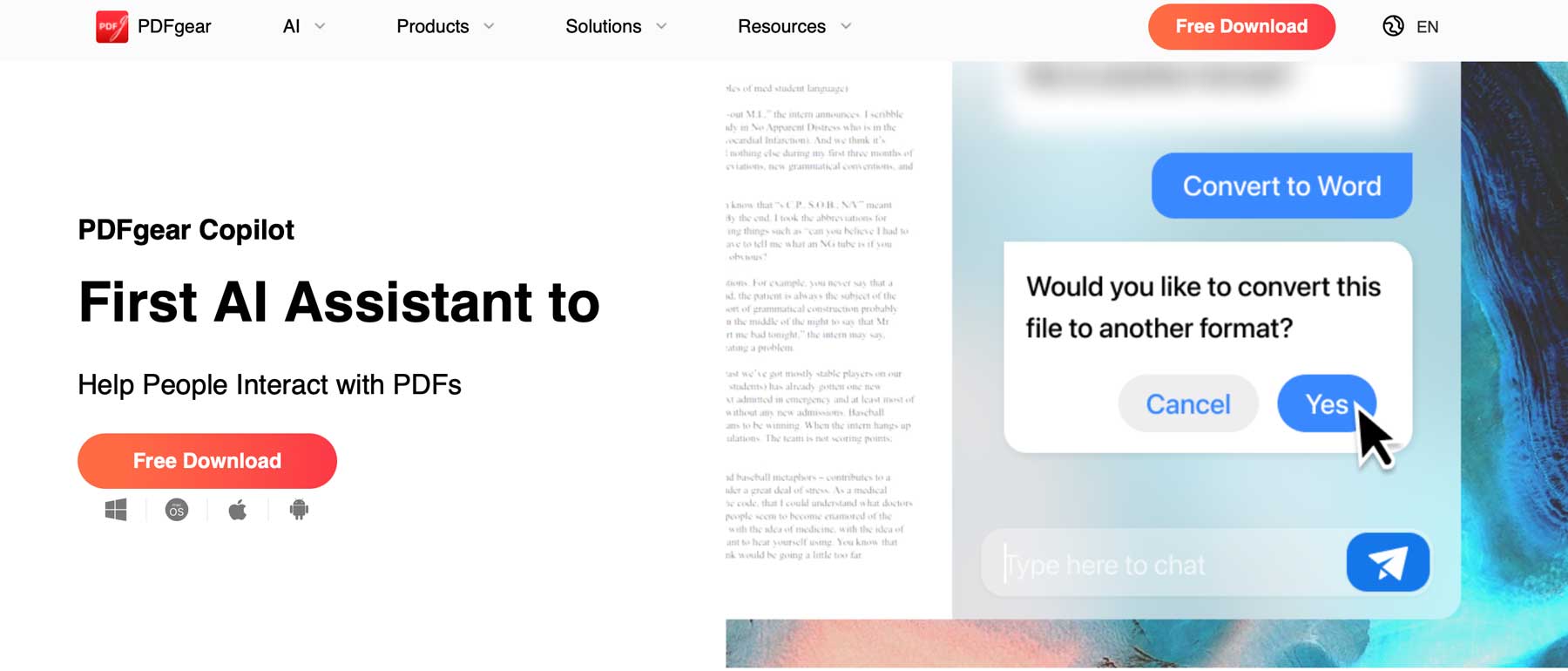
PDFgear Copilot, an AI-powered assistant, extracts and summarizes information in PDF documents. It utilizes OpenAI’s ChatGPT language model to help users locate important information in documents while conducting research. It allows you to chat with a document, ask questions about its contents, and easily summarize entire PDFs.
PDFgear Is a Powerful AI Tool For Working With PDF Documents
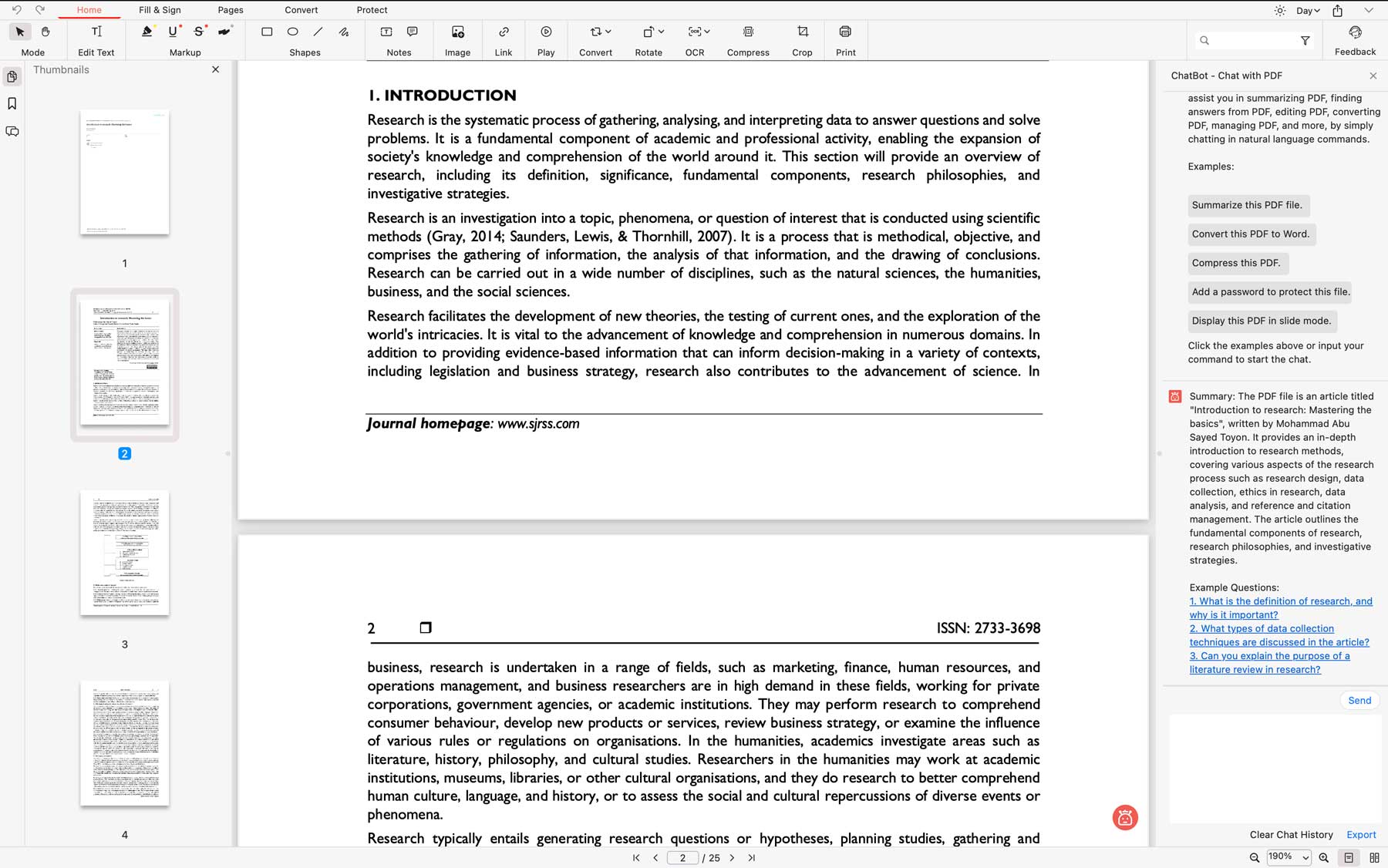
PDFgear Copilot can also provide context or clear up confusing parts of your documents. It can also rewrite sections of documents and export PDFs into other file formats. Users can also perform actions, such as converting, printing, or saving PDF files, without manually navigating the software’s interface. Simply give PDFgear Copilot a command and watch as it effortlessly completes the task. PDFgear Copilot is an excellent tool for researchers who must scan through large amounts of PDFs to extract important, relevant information.
What We Like About PDFgear Copilot
- Interact With PDFs: Summarize, analyze, and interact with PDF content through natural language processing
- ChatGPT Integration: Find key information and get answers by using built-in ChatGPT functionality
- Streamline PDF Workflows: Complete tasks, such as converting, printing, and saving PDFs with natural language processing
- Support for Multiple Languages: PDFgear Copilot supports over 100 languages, making it accessible to a large number of users
What Could Be Improved
- No Dark Mode: PDFgear doesn’t come with an option to switch to dark mode, potentially alienating those who prefer it
Who Is PDFgear Copilot Best For?
PDFgear Copilot is a great tool for Windows and Mac users who want a faster way to interact with PDF documents. Users can summarize, extract, and search for info in the document, making gathering research much quicker and easier.
Community Reviews and Ratings
Although reviews are limited, users report that editing and altering PDFs is easy, thanks to the ChatGPT integration. However, some users want PDFgear to include a dark mode.
Pricing
PDFgear Copilot is available for free.
5. Consensus
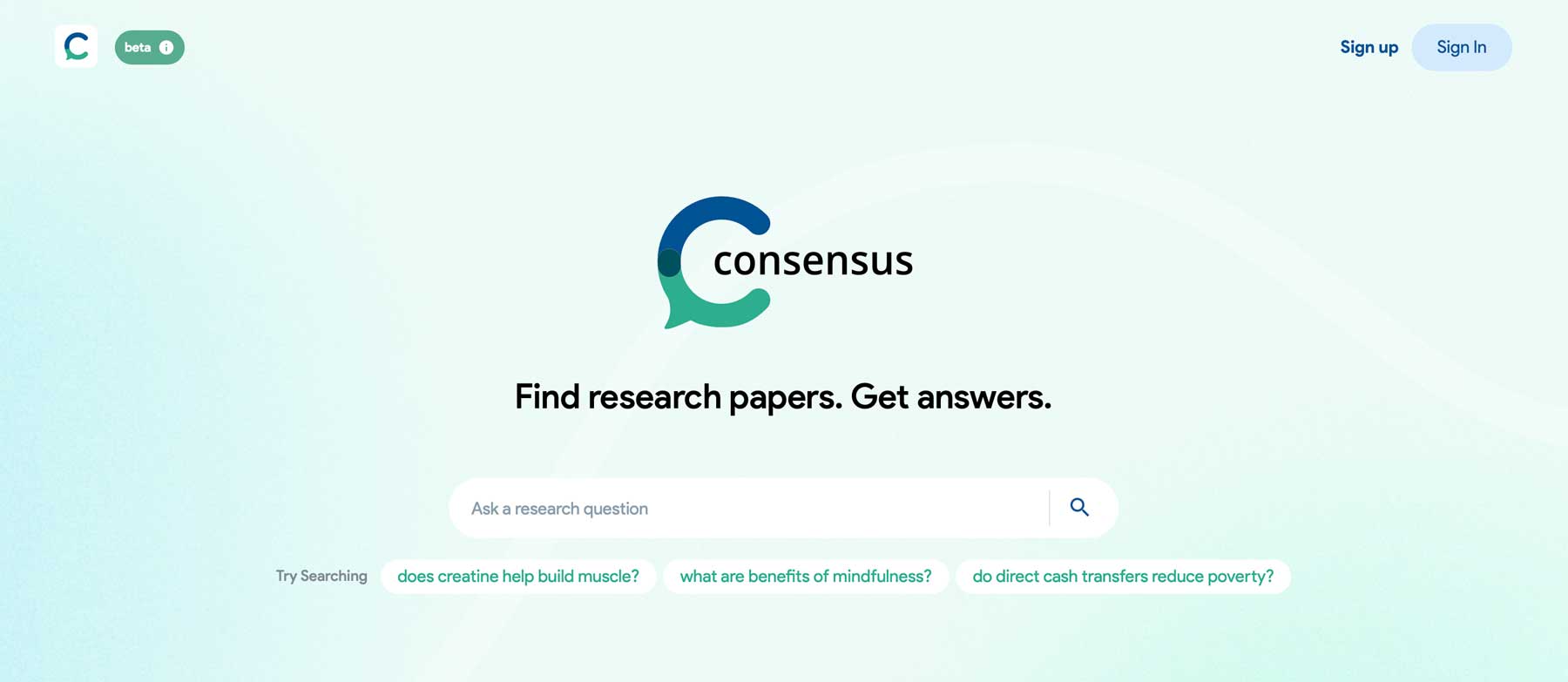
Consensus is an AI-powered search engine that concentrates on providing users with unbiased and accurate information from diverse and reliable academic sources. It can search through millions of academic publications to find relevant information to answer questions, provide references, and cite research studies. It uses GPT-4 technology to generate concise summaries of the top research papers related to your search. When asking a yes or no question, the Consensus Meter can provide an overall summary indicating the consensus among research and categorize it with yes, no, or possibly based on supporting evidence.
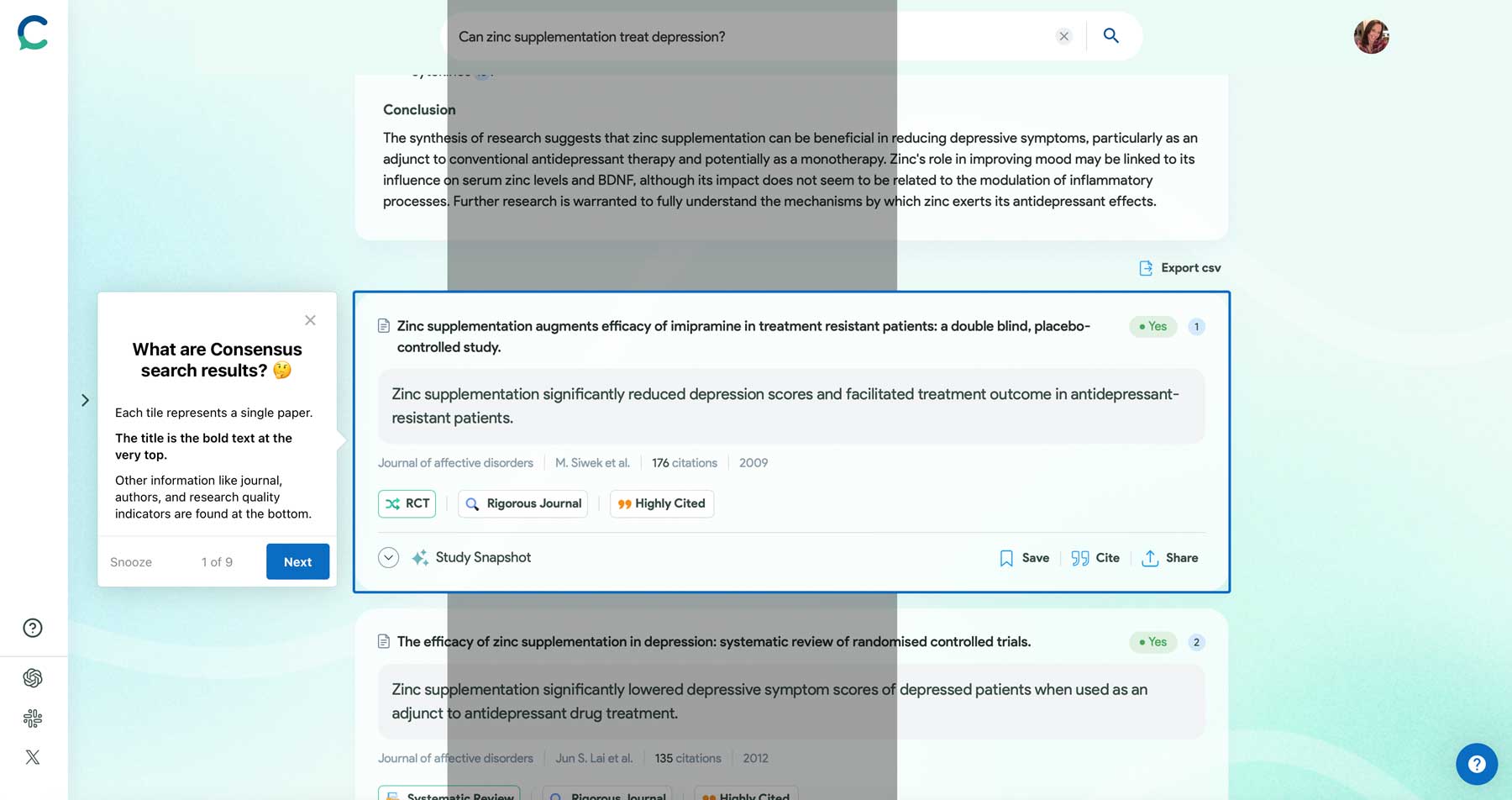
What We Like About Consensus
- AI-Powered Academic Search: Consensus uses AI to quickly analyze millions of peer-reviewed research papers and provide comprehensive, accurate answers to users’ questions
- Scientifically-Verified Results: Consensus only consults previously published, scholarly works from leading global journals and authors, ensuring the information is reliable and unbiased
- Fast and Reliable Search: The AI-powered search allows users to quickly find the most important insights on a topic, saving time compared to traditional research methods
- GPT-4 Summary: Consensus leverages GPT-4 to deliver concise summaries of the top 5-10 most relevant research findings for a given question
What Could Be Improved
- The Consensus Meter: Although Consensus is usually accurate, there may be times when the meter does not capture the specific nuance and context of research findings
Who Is Consensus Best For?
Consensus is a great tool for researchers, content creators, or anyone needing reliable, up-to-date scientific literature information. It can generate summaries, make citations, and provide an overall reliable and informative solution for those tasked with gathering a lot of information quickly.
Pricing
Consensus offers a free plan with paid plans starting at $11.99 per month.
6. Connected Papers
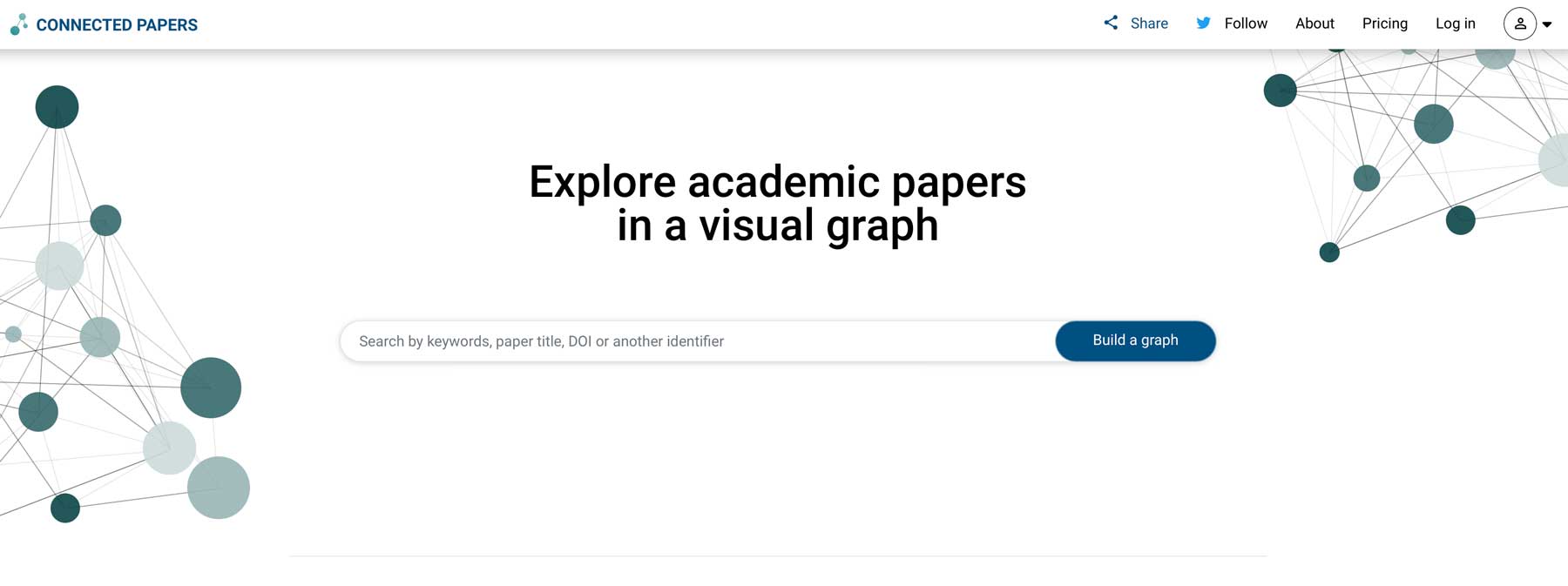
Connected Papers is an innovative research tool that helps scientists and scholars efficiently explore the literature relevant to their work by providing a visual, similarity-based mapping of related academic papers. It uses circles to represent different papers. The size of the circle corresponds to the frequency of citations by other researchers. Papers that closely resemble the original paper you provided are positioned closer together and connected by lines. The thickness of the line indicates the strength of the relationship between the documents. By following the connections between papers, you can use Connected Papers to explore new research areas within your field.
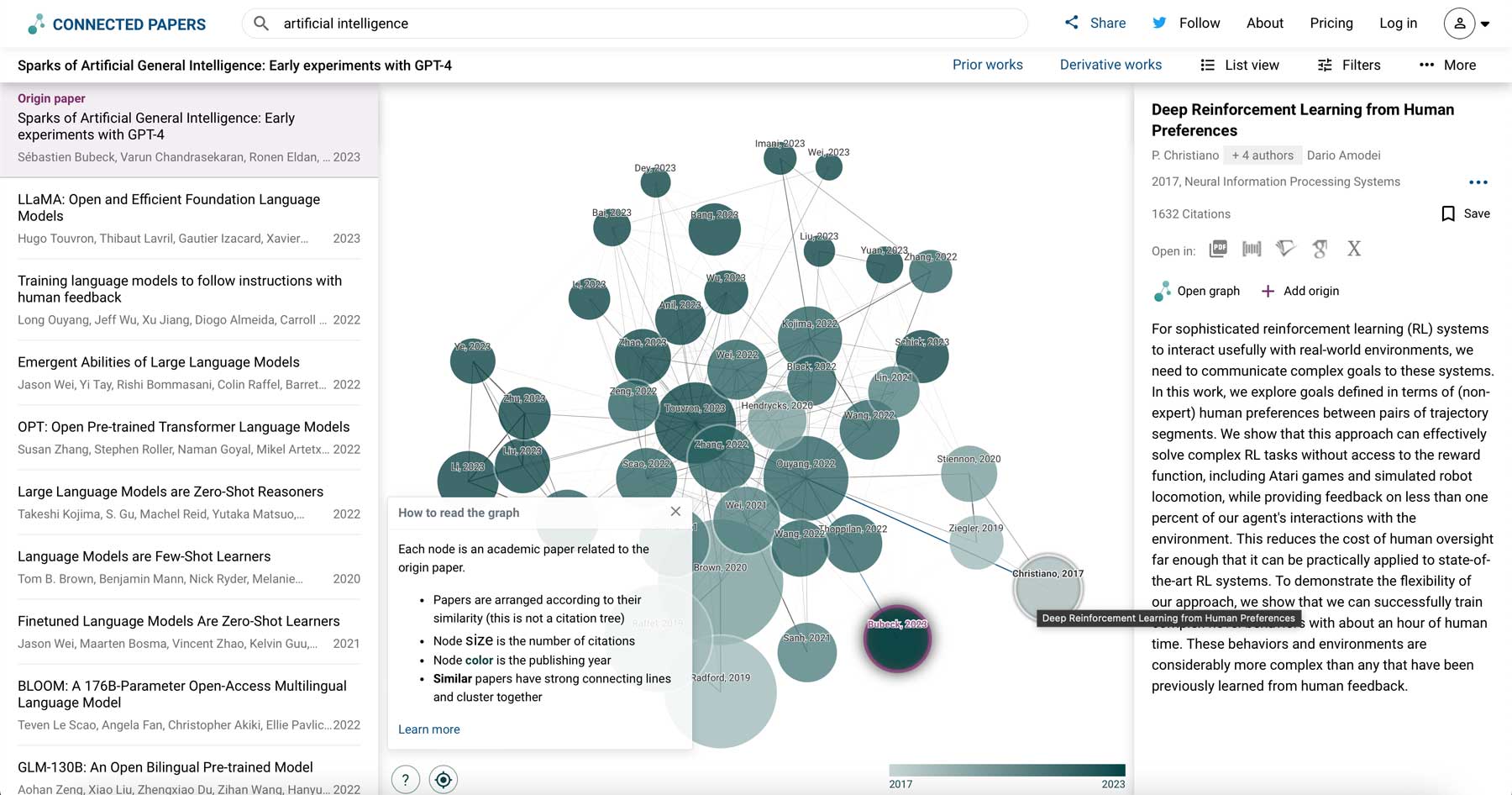
What We Like About Connected Papers
- Similarity Graphs: Connected Papers produces a visual graph displaying related papers. However, unlike a traditional citation tree, it emphasizes semantic similarity, meaning that papers with shared citations and references are more connected
- Prior and Derivative Works: Connected Papers identifies influential prior works that have shaped the current research landscape. Additionally, it can reveal derivative works that build upon the original paper’s ideas
- Multi-Origin Graphs: You can enter multiple papers as a starting point so that CP can create a combined graph highlighting the relationships between them
- Save Papers and Graphs: Save papers and graphs to revisit and explore topics further
What Could Be Improved
- Limited Citation View: Unlike citation trees, Connected Papers doesn’t directly show how papers cite each other
Who Is Connected Papers Best For?
Connected Papers is a valuable tool for researchers actively exploring their field, but it’s important to know its strengths and weaknesses to use it effectively. For example, because Connected Papers uses a semantic citation method, there may be better options for those who require an understanding of how specific papers influence each other.
Pricing
Connected Papers offers a free plan with paid plans starting at $10 per quarter.
7. Litmaps
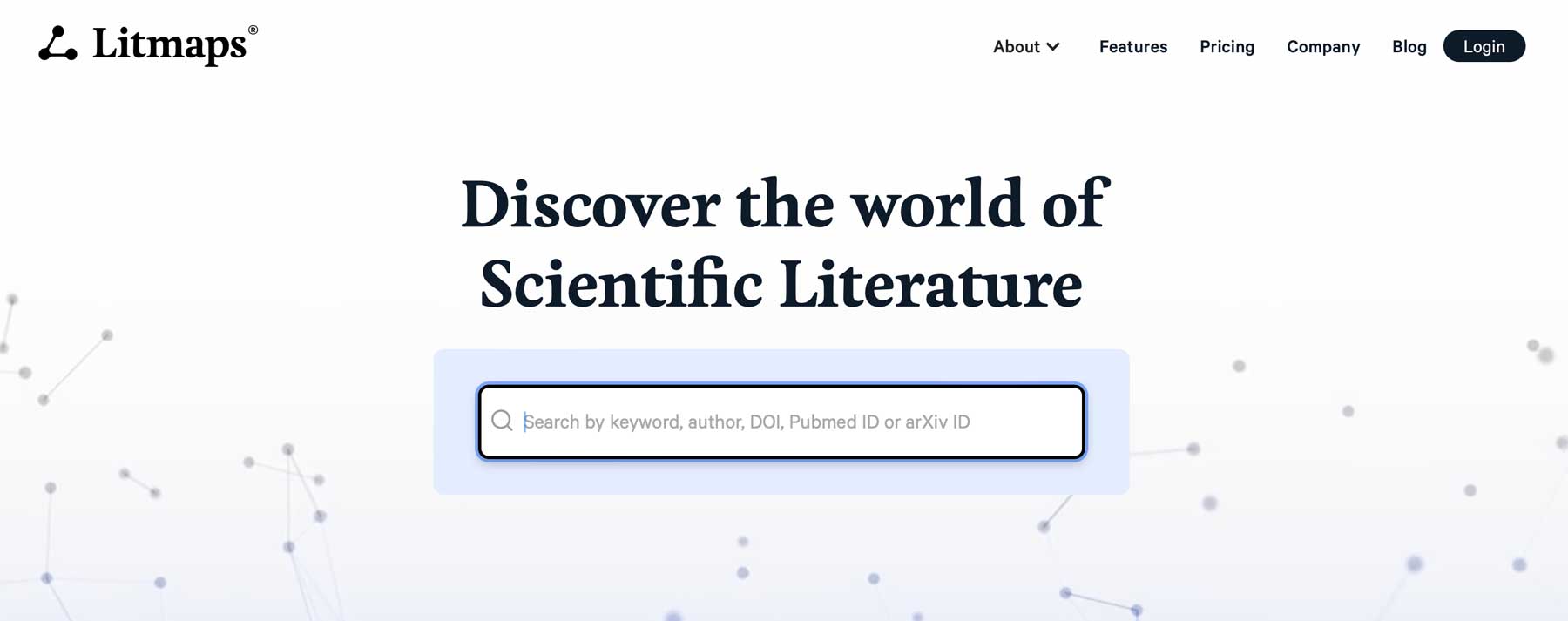
Litmaps is a literature mapping tool that helps researchers discover new and relevant research papers, visualize the relationships between papers, and share their research. It works by using connectedness theory, which allows researchers to quickly scan Litmap’s network of academic papers around the documents they know, discovering vital related papers they may not know about. Litmaps can also generate reading lists and notify users when relevant new papers are published, making it easier to stay up-to-date on the latest research.
What We Like About Litmaps
- Search Academic Papers: Litmaps allows you to search through a vast database of over 260 million academic papers to find relevant articles
- Mind Mapping: Litmaps lets you visualize your research by creating a map of interconnected articles and annotating them for better understanding
- Explore Research From Various Angles: Dynamic Exploration allows users to explore research from different angles by rearranging how papers are positioned on the map.
- Collaboration Features: The platform allows you to share your research maps with colleagues, students, or advisors to facilitate collaboration
What Could Be Improved
- Limited Free Plan: Some features, like unlimited searches, are only available on paid plans
Who Is Litmaps Best For?
Litmaps, a powerful literature mapping tool, aids researchers in becoming more productive and staying ahead of the curve in their respective fields. It perfectly suits researchers, students, and early-career researchers who aim to write research papers more intelligently and productively.
Pricing
Litmaps offers a free plan with paid plans starting at $10 per month.
8. Jenni
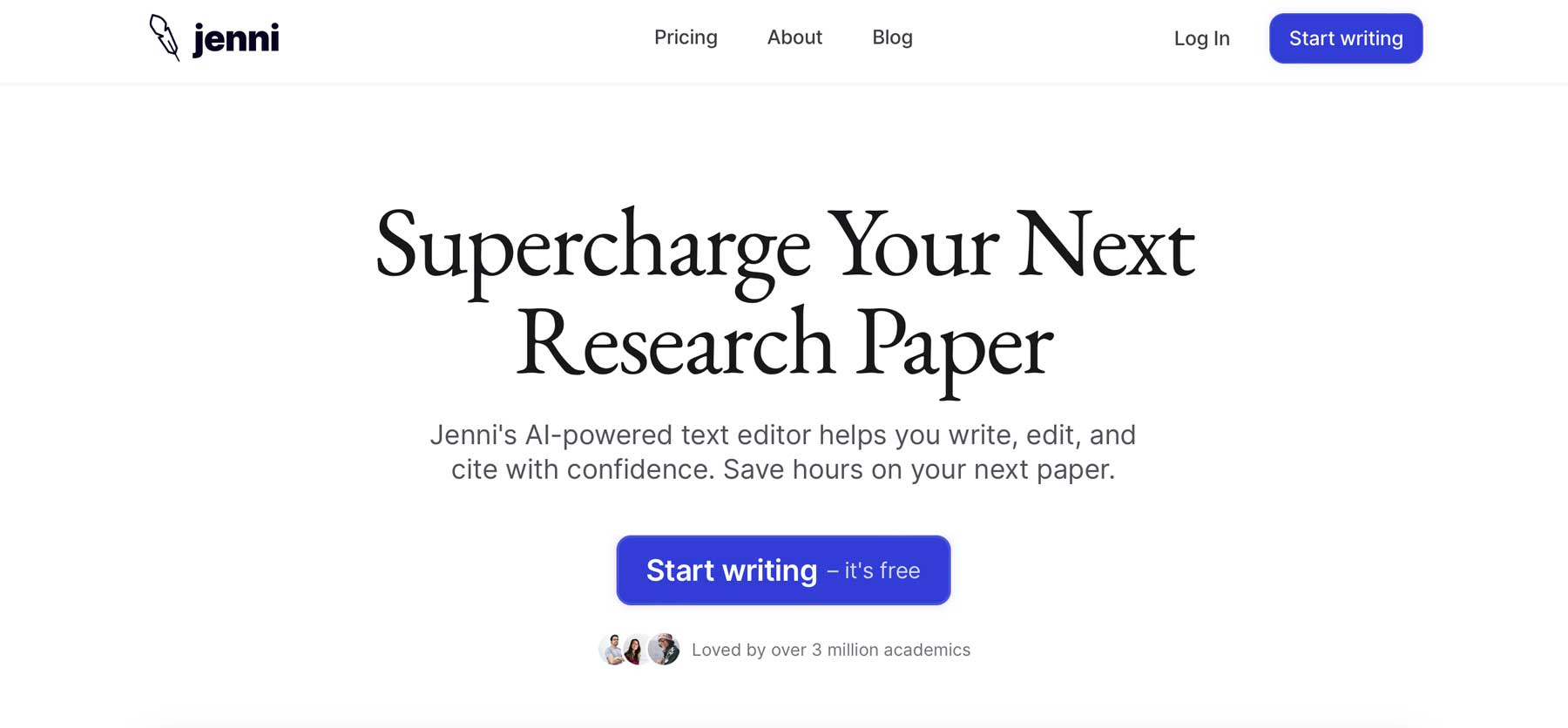
The next AI tool for research on our list is Jenni. It’s an AI-powered writing assistant designed to help students and researchers with academic writing tasks. It uses machine learning and natural language processing (NLP) to provide content suggestions, writing feedback, and research assistance. It’s particularly useful for writing essays, research papers, literature reviews, and more. Jenni can also help with citations and references and check for plagiarism.
What We Like About Jenni
- AskJenni: Use an AI research assistant that can help answer research questions and provide document-related clarifications
- Citation and Reference Assistance: Jenni can properly format citations and references in styles like APA, MLA, and Chicago
- AI Commands: Jenni can perform tasks like paraphrasing, rewriting, and simplifying existing text
- AI Autocompletion: Jenni can suggest and complete sentences to help you write faster
What Could Be Improved
- Limited Content Types: Compared to other AI writing tools like Copy.ai and Jasper, Jenni.ai only offers a limited number of content types such as blogs, essays, emails, and free-flow writing
Who Is Jenni Best For?
Jenni AI best suits students, scholars, researchers, and writers who require assistance with high-quality, plagiarism-free academic and research-oriented writing tasks. It provides AI autocompletion for automatically filling in gaps in your writing, a citation and reference assistant, and various AI commands for paraphrasing, rewriting, and simplifying text.
Pricing
Jenni offers a free plan with paid plans starting at $20 per month.
9. Paperpal
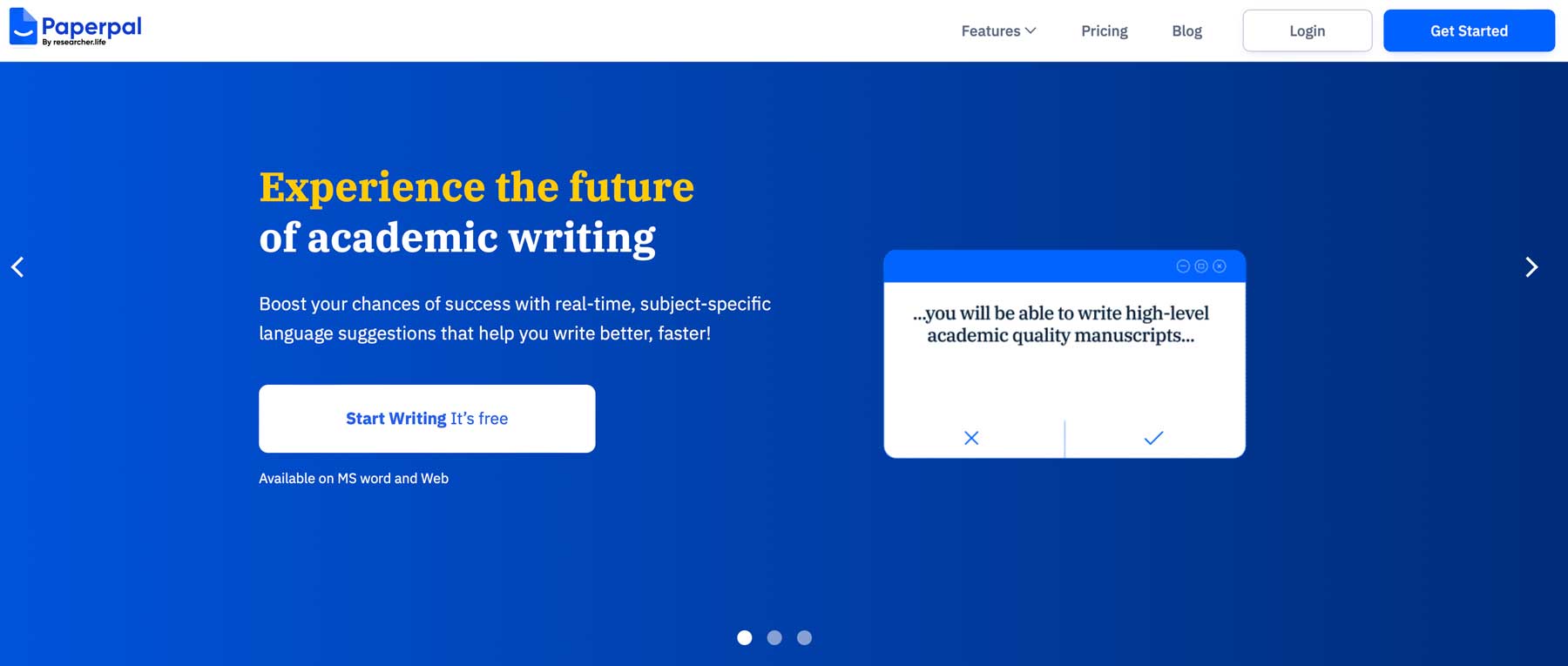
Paperpal is an AI-powered academic writing assistant that helps researchers and students improve their writing. It includes features such as a plagiarism checker so users can scan their documents for potential plagiarism to ensure academic integrity. It can also fix grammar, spelling, and styling concerns. Through generative AI, Paperpal can help users overcome writer’s block by providing outlines, titles, and other content. Another useful feature is the academic translation, which enables Paperpal to convert text from more than 25 languages to English, allowing researchers to find relevant research in other languages.
What We Like About Paperpal
- Plagiarism Check: Paperpal’s plagiarism checker allows users to scan their documents for potential plagiarism and ensure academic integrity
- Rewriting and Paraphrasing: Paperpal’s rewriting and paraphrasing tools allow users to rephrase sentences, trim wordy text, and improve the overall tone and clarity of their writing
- Generative AI: Paperpal Copilot, the generative AI feature, can help users overcome writer’s block by generating outlines, titles, abstracts, and other content to kickstart the writing process
- Academic Translation: Paperpal can instantly translate content written in over 25 languages into English, allowing users to focus on their research while the tool refines their writing
What Could Be Improved
- Grammar Checker: Although Paperpal includes a grammar checker, it’s not as robust as a dedicated solution like Grammarly
Who Is Paperpal Best For?
Paperpal is best suited for researchers, professors, and authors who need specialized AI-powered writing assistance to improve their chances of publishing success in academic and scientific fields.
Community Reviews and Ratings
Users say Paperpal does a great job with plagiarism but sometimes struggles with grammar.
Pricing
Paperpal offers a free plan with paid plans starting at $19 per month.
10. Research Rabbit
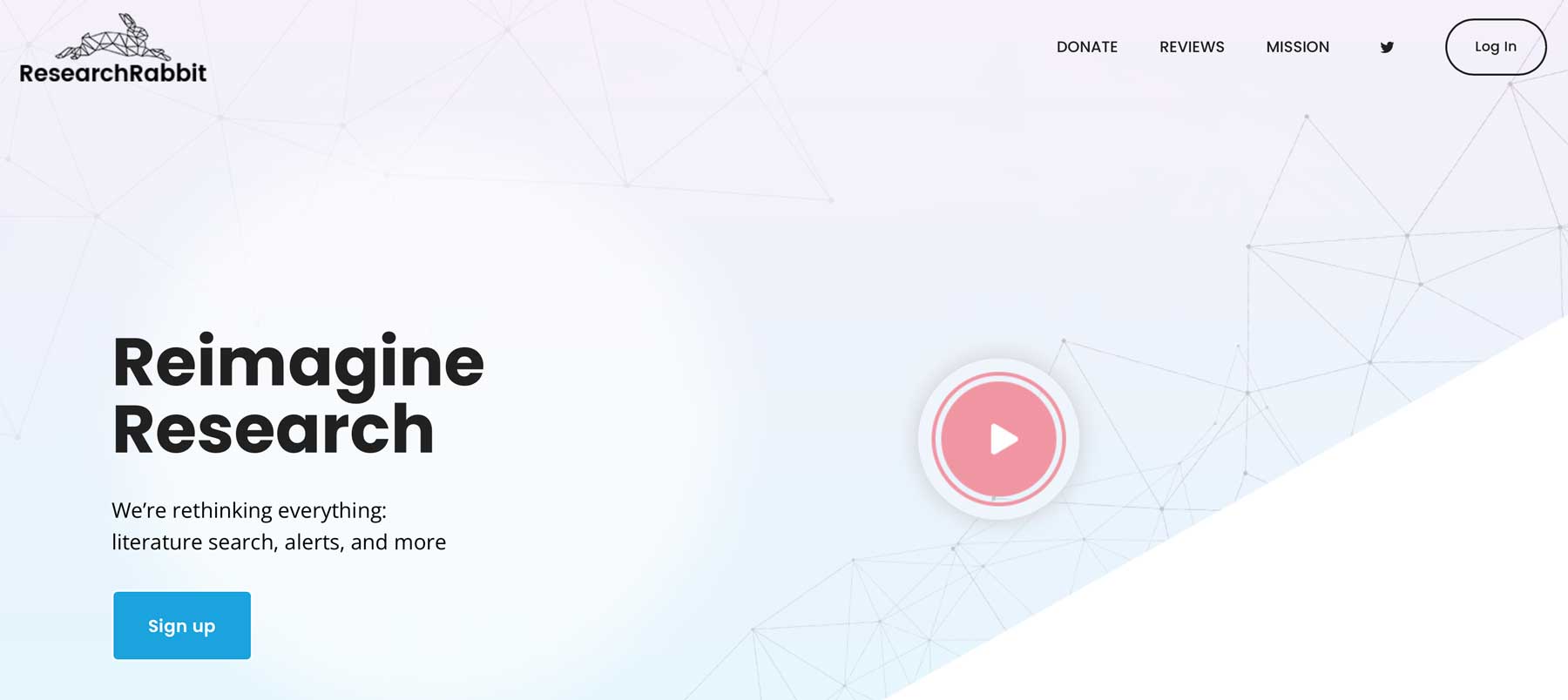
Research Rabbit is a free, web-based research tool that helps users discover and organize academic research. Users can create collections of research papers and get access to recommendations for similar works. Users can visualize the connections between research papers through graphs and timelines, allowing users to trace the evolution of a particular area of research.
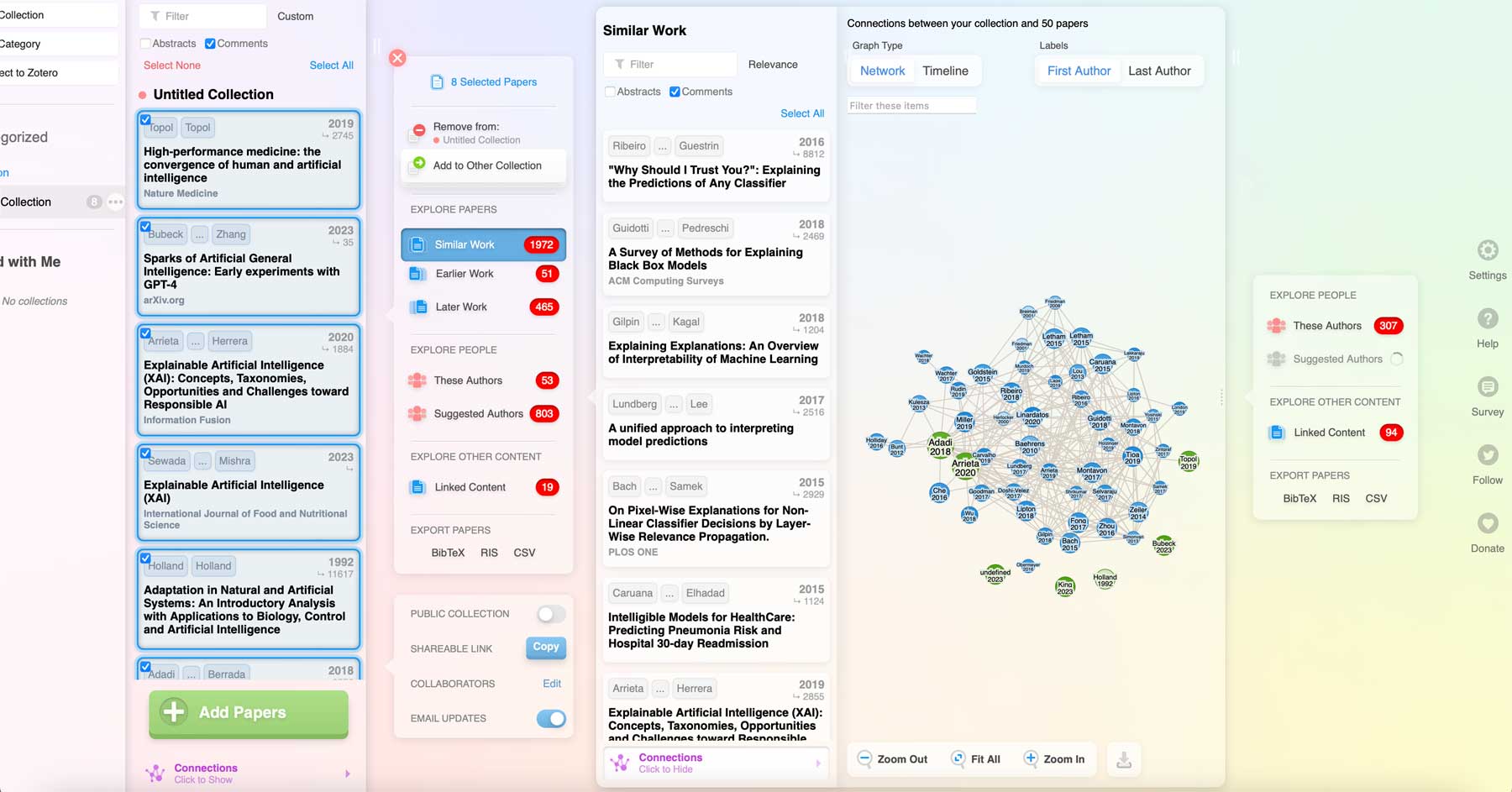
What We Like About Research Rabbit
- Intuitive Exploration: Research Rabbit allows users to easily create collections of papers and discover new, relevant publications through personalized recommendations
- Powerful Visualizations: Offers interactive visualizations like citation networks and timelines to aid users in grasping the connections among publications and authors
- Collaboration Features: Users can share collections and collaborate with others, leaving comments and helping to kickstart each other’s research processes
- Citation Management: Research Rabbit supports citation management, allowing users to easily generate citations in various styles and organize their references
What Could Be Improved
- Navigation challenges: The cluttered interface may be difficult for some
Who Is Research Rabbit Best For?
Research Rabbit is good for graduate students, researchers, and other academic types. Research Rabbit can map citation networks, discover author collaborations, and more. Because of this, it can help find connections that might otherwise be missed.
Pricing
Research Rabbit is completely free.
Comparing the Best AI Tools For Research
When it comes to choosing the best AI tool for research, it’s important to consider a few factors. Price, features, and user reviews should all come into play. Whether you need a tool for creating citations, writing research papers, or mapping similar research articles, the research tools on our list all offer something for everyone.
Top Three Best AI Tools for Research Feature Comparison
To give you a better idea of what our top three best AI tools for research offer, we’ve created a comparison table that outlines each entry’s top features and starting price to make the decision easier.
| 🥇 Quillbot | 🥈 Bit AI | 🥉 Scite | |
|---|---|---|---|
| Free Version | ✔️ | ✔️ | ❌ |
| AI Writing Assistant | ✔️ | ✔️ | ❌ |
| Collaboration Tools | ✔️ | ✔️ | ✔️ |
| Integrations | ✔️ | ✔️ | ✔️ |
| Search Documents | ✔️ | ✔️ | ✔️ |
| Create Citations | ❌ | ❌ | ✔️ |
| Summarize Content | ✔️ | ❌ | ✔️ |
| Starting Price | $8.33/month | $12/month | $20/month |
| Get Quillbot | Get Bit AI | Get Scite |
Pricing Comparison for the Best AI Tools for Research
In addition to features, price is critical. There are free and paid tools on our list, all with similar price points. Refer to the table below to view pricing for all ten of the AI tools for research on our list along with average user ratings.
| Plugin | Starting Price | Free Option | User Reviews (avg) | ||
|---|---|---|---|---|---|
| 🥇 | Quillbot | $8.33/month (billed annually) | ✔️ | ⭐⭐⭐⭐⭐(4.5/5) | Visit |
| 🥈 | Bit AI | $12/month | ✔️ | ⭐⭐⭐⭐⭐(4.5/5) | Visit |
| 🥉 | Scite | $20/month | ❌ | ⭐⭐⭐⭐⭐(4.5/5) | Visit |
| 4 | PDFgear Copilot | Free | ✔️ | ⭐⭐⭐⭐⭐(5/5) | Visit |
| 5 | Consensus | $11.99/month | ✔️ | N/A | Visit |
| 6 | Connected Papers | $10/quarter | ✔️ | N/A | Visit |
| 7 | Litmaps | $10/month | ✔️ | N/A | Visit |
| 8 | Jenni | $20/month | ✔️ | N/A | Visit |
| 9 | Paperpal | $19/month | ✔️ | ⭐⭐⭐⭐⭐(4.75/5) | Visit |
| 10 | Research Rabbit | Free | ✔️ | N/A | Visit |
What Are the Best AI Tools for Research?
Whether you’re looking to organize how you collect research or generate citations, the AI research tools on our list can help. Quillbot is an excellent choice for researchers looking to summarize lengthy text, paraphrase content, and check for grammatical errors. With a tool like Bit AI, you can easily create wikis, knowledge bases, and more through a drag-and-drop document builder. On the other hand, if you need a tool to analyze citations or suggest relevant sources, Scite is an excellent choice. No matter what type of research you do, any of the tools on our list will be a welcome addition to your workflow.
The post 10 Best AI tools for Research in 2024 (Compared) appeared first on Elegant Themes Blog.

